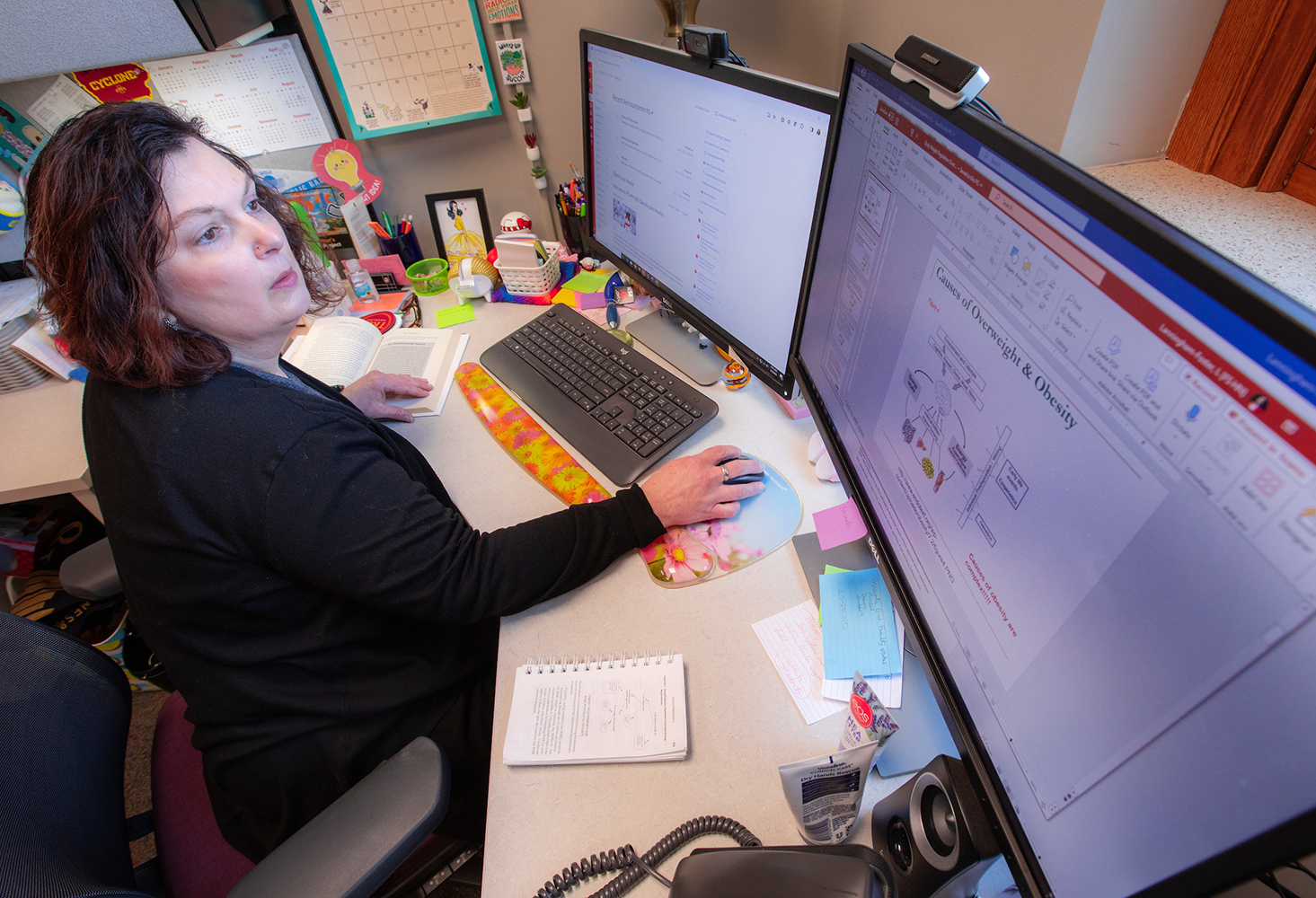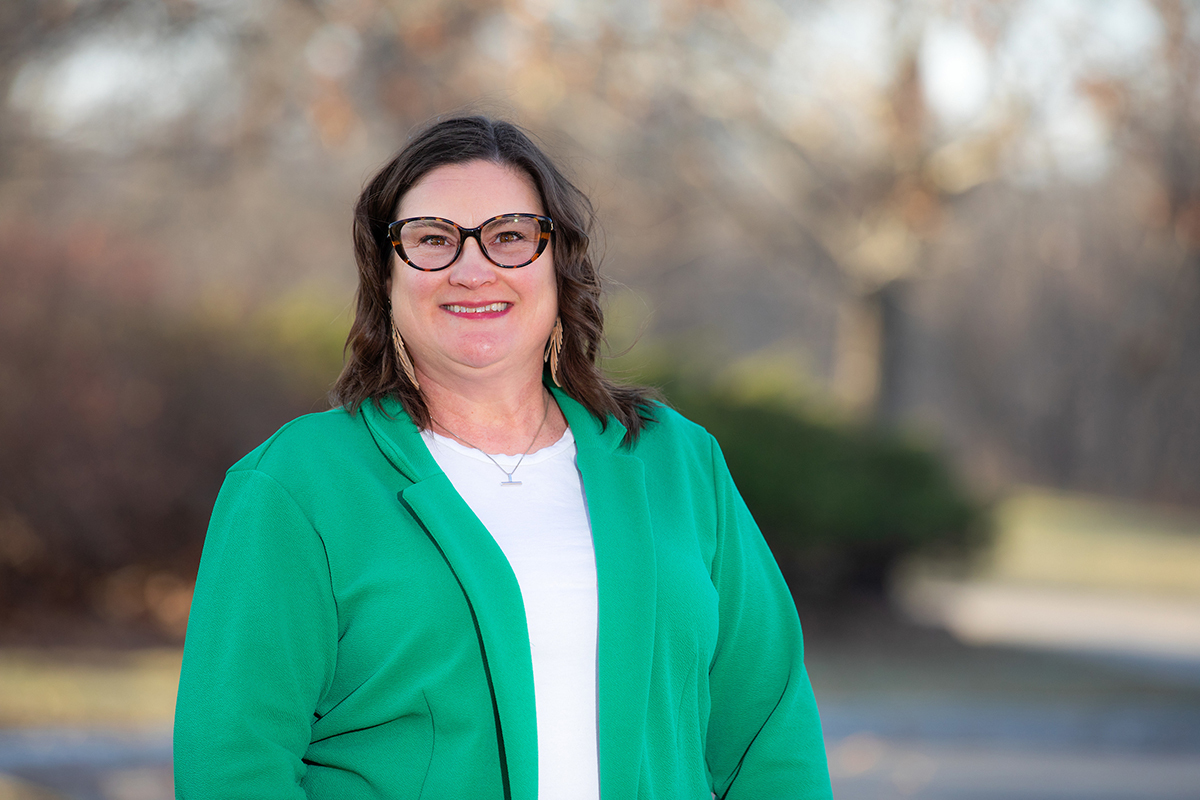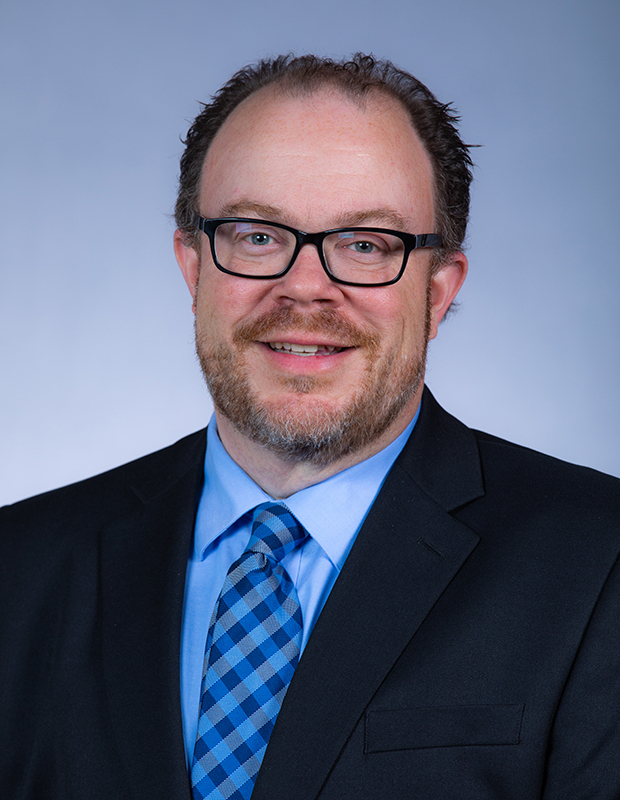For some, class is in session

Winter session instructor Lorraine Lanningham-Foster confirms course content Wednesday morning in her Food Sciences Building office. Photo by Christopher Gannon.
Lorraine Lanningham-Foster, department chair and associate professor of food science and human nutrition, is one of dozens of faculty members teaching this winter session. The four-week term concludes Friday, Jan. 12.
Her course, Obesity and Health (FSHN 365), is required for students in two of the department's six undergraduate majors. Because it's a relevant topic for so many and doesn't have any prerequisites, she said it's also a popular elective among other majors, including kinesiology and the pre-health disciplines. She has 11 students this winter, and the spring section is full.
"It draws a really great mix of students," she said. "My hope is they leave with a different viewpoint of obesity, an understanding that it's much more complex than diet and exercise."
The course structure relies less on quizzes and tests and more on discussion and individual reflections, she said, which requires the students to keep a certain pace so they're prepared to participate in discussions.
While she's taught a course focused on obesity for about 15 years, Lanningham-Foster said she first offered this course as a four-week option last winter. With that structure prepared, and anticipating the condensed format also might appeal to summer students, she taught it in four weeks last summer, when 14 students enrolled. She said transfer students in particular, whose program schedules may not contain much wiggle room, told her the four-week option is a helpful solution.
"They're showing me they can do this successfully. [The shorter window] is attractive to some students -- trying to get an elective in, trying to catch up with their requirements," she said.
Five questions about the free counseling option for employees
In fall 2020, the Employee Assistance Program (EAP), part of Iowa State's benefits package, began providing on-campus counseling sessions for employees on Wednesdays. Last month, in response to a growing demand, the current counselor, Katie Smith, added Thursdays to her on-campus schedule.
Counseling sessions are free to benefits-eligible faculty and staff and their immediate family members. An appointment is required; call 800-327-4692 to schedule one.

Photo by Christopher Gannon.
Meet:
Katie Smith, Licensed Master Social Worker
On campus: Wednesdays and Thursdays 9 a.m.-5 p.m.
Where: Accessible, first-floor office on the north side of campus
Education: B.A. in Liberal Studies (focus in psychology), Arizona State University; Master of Social Work, University of Iowa, Des Moines
What can counseling help me with?
Smith: My job is to help you reach your goals about anything in your life that's causing distress. Some examples might be relationships that need improvement, trauma, stress and anxiety, self-esteem, anger management, grief and loss. I strive to provide a compassionate, unbiased environment so you feel supported and comfortable sharing. I help you problem-solve by identifying coping skills and finding helpful resources. During counseling sessions, if it's clear you'd benefit from a specific type of therapy, I would refer you to a therapist who's a good fit for your needs. I'm not a substitute for therapy.
How would I get started?
Smith: Call the EAP number, 800-327-4692, and indicate you're an Iowa State University employee. The counselor who answers the phone will ask you questions to assess what type of assistance you're seeking and schedule your first appointment with the appropriate professional at Employee and Family Resources, the contracted provider for Iowa State's employee assistance program.
If you prefer an in-person counseling session, they'll schedule it with me. Sessions typically are about 45 minutes long. During our first appointment, I'll do a full assessment to find out what your needs are. We'll schedule a second appointment, if needed. We can use up to six free sessions, per issue, for assessment and brief counseling; some people's issues are resolved after two or three sessions. Together, we would determine if you need to continue with a specific type of therapy. My job is to provide referrals that give you options.
Lots of help
Counseling isn't the only service offered in the Employee Assistance Program. Legal or financial consultations, life coaching, referrals for child and elder care, and identify theft recovery assistance also are available at no cost. Learn more in this video.
Will Iowa State know I've sought EAP services?
Smith: No. Our services are confidential. All clients go through our system as a number. The numbers are kept for utilization purposes. In fact, that's how a second day of on-campus counseling was added.
I'm a bit anxious about asking for help. Any suggestions?
Smith: I see more and more clients in their first encounter with counseling. So, showing up that first time, letting me ask questions about what you want help with, is the way we get started. For anyone who has been thinking about counseling, I'd encourage you to try at least one session to see what it's like and if you find it helpful. I love working with both adolescents and adults, including couples and families.
The EAP is a fabulous program and a simple way for people to start with mental health counseling.
Why did Iowa State request an on-campus counseling option?
Ed Holland, ISU benefits director: We know that mental health wellness is a growing concern within and outside the workplace. We promote several resources available to Iowa State employees, including EAP, because we believe employees who are encouraged to live well outside of the workplace often work even better in the workplace. Our EAP benefits stimulate a healthier work environment and support a culture of wellness. Reducing any barriers to accessing the services -- such as offering more on-site counseling sessions -- can only benefit our employees.
An additional note: Employee Family Resources has offices in downtown Des Moines and West Des Moines if urgency, your location or day-of-week preference better suits one of those sites. Virtual counseling sessions and a hybrid combination are options.
Financial aid team is prepared for changes with revamped FAFSA
The office of student financial aid is adjusting its timeline to send financial aid offers to students and their families due to a three-month delay in the release of a revamped Free Application for Federal Student Aid (FAFSA).
Instead of early February, Iowa State offers for the 2024-25 academic year will go out in mid-March.
Student financial aid director Chad Olson said the U.S. Department of Education typically makes the form available on Oct. 1. But with several changes to the application, students and families didn't receive access to it until Dec. 30 in a "soft launch." The online form was made available for intervals of time while staff monitored the website's performance to provide a reliable experience to the millions of families completing it.

Chad Olson
Olson said the streamlined application form -- more than 75 questions have been eliminated -- is intended to simplify the process for students and their families. It also will increase the number of students eligible for Pell Grants as well as the number who qualify for the maximum grant amount, which was raised to $7,395 for the 2023-24 academic year.
In Iowa, it's expected that an additional 6,603 students will be eligible for the program, and 13,590 more students will qualify for the maximum grant amount, according to data from the Department of Education.
"Currently, about 19% of Iowa State students qualify for Pell Grants," Olson said. "It could certainly bump up with the changes in the application."
Helping students prepare
Throughout the fall semester, Iowa State's financial aid and admissions teams shared information with students and their families to help them prepare for the changes. Incoming students were encouraged to create a studentaid.gov account rather than waiting until the application was available, as it takes a few days to verify new accounts.
Students also received reminders to complete Iowa State's One App scholarship form, which opened on Sept. 19, 2023. Scholarship deadlines vary among the office of student financial aid and colleges -- a complete list is available on the financial aid website.
Now that the new FAFSA form is available, Olson said it is important that students complete the form as soon as possible to meet Iowa State's priority dates for financial aid:
- Feb. 1 for incoming students
- Feb. 29 for current and transfer students
'All hands on deck'
Much of the processing of financial aid offers is automated, Olson said. This will be the first year that offers are processed through Workday Student. Once offers are determined, it's "all hands on deck" to print and send the 14,000 aid forms to incoming students.
"Everyone is stuffing envelopes, all full-time staff and our student employees," Olson said.
After the initial batch of offers is sent out, student financial aid staff continue to process requests on a weekly basis. Olson said they generally see a high volume during the first few weeks as they process aid offers for incoming students, and another peak around April 1, when they extend offers to transfer students.
